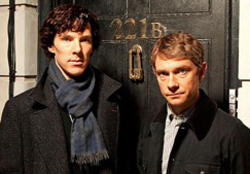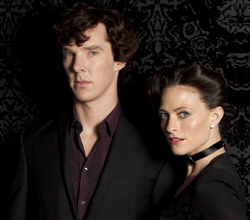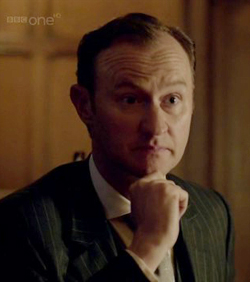
“A blog”
“About?”
“Us.”
“You mean me.”
“Why?”
“You’re typing a lot.”
Sherlock and Watson (as if you couldn’t guess).
As we begin Season 2 of Sherlock on Masterpiece Mystery, Holmes has become an Internet phenomenon. He’s learning to deal with the fame.
Meanwhile, my friends at CrimeHQ have presented me with the monumental task of blogging about the new series of Sherlock airing on PBS this month.
Monumental for two reasons:
1) The deeply Sherlockian, immensely talented Lyndsay Faye watched the U.K. feed of Sherlock Season 2 and provided commentary here. With my limited knowledge of the Arthur Conan Doyle/Sherlock Holmes canon, there is no way I can surpass her insights. (Here’s what she said about “A Scandal in Belgravia.”)
2) I’m dazzled by “A Scandal in Belgravia” (Season 2, Episode 1) and I’m still trying to sort it all out. If Dr. Watson has trouble keeping up, where does that leave me?
With those caveats in place, I commence.
Season 2 picks up where we left off at the end of Season 1, with Sherlock and Watson about to meet their demise at the hands of Jim Moriarty, when suddenly . . . a cell phone rings and Moriarty remembers a more pressing engagement that demands his immediate attention. La-di-dah and he’s gone. No worries, we know he and Sherlock will cross paths again. And frankly, I can’t wait. Even though the number of minutes he’s spent on the screen barely breaks double-digits, Andrew Scott has created an indelible Moriarty imbued with campiness and menace simultaneously.
The same can be said for Mark Gatiss as Mycroft Holmes, who’s once again behind some ultra-high-level machinations involving nothing less than the fate of the world (or at least the parts of it that matter). He’s clever, collected, and connected; and I’d be willing to bet he’s never shed a drop of perspiration—nor a tear—in his life. I’m really glad he’s on our side. (He is on our side, right?)

Benedict Cumberbatch as Sherlock and Martin Freeman as Watson are wonderful together; and their characters’ relationship has settled into familial comfort. In fact, the domestic scenes at 221B Baker Street, including a Christmas gathering that could rightly be described as “touching,” are some of the best in the episode.

Watching Sherlock is exhilarating and exhausting. Most—and best—of all it raises expectations: what the audience can (and should) expect from a television program, and what the people who create television programs can (and should) expect from the audience. We say, “Challenge me. Go faster.” They say, “All right, but you’ll have to keep up or be left behind.” And we promise we’ll try because we know it will be worth it.
Or to put it another way: “Brainy is the new sexy.”
That’s what Irene tells Sherlock. As if he didn’t know. As if this series didn’t prove it.
Leslie Gilbert Elman is the author of Weird But True: 200 Astounding, Outrageous, and Totally Off the Wall Facts. Follow her on Twitter @leslieelman.
See all posts by Leslie Gilbert Elman on Criminal Element.
See all our coverage of the new Sherlock!

I actually like this TV series more than the new Sherlock movies. Fun, fast moving, sophisticated; you name it. But of course that’s what happens when you have BBC behind you and you don’t have to produce 24 episodes a year. Just compare the disgrace of the American TV series Camelot with the British Merlin. This just proves that famous actors cannot save a bad script no matter how hard they try.
I think the fact that the creators are the writers is important. They’re so vested in the material that they won’t tolerate mediocrity. Of course the fact that the creators/writers are brilliant doesn’t hurt! Talent shines.
I totally agree with @Lakis – this is way better than the new movies. I do wish they would make more than three a year though.
BBC posts Watson’s blog here:
[url=http://www.johnwatsonblog.co.uk/]http://www.johnwatsonblog.co.uk/[/url] But you may want to wait until after the last episode this season to look.